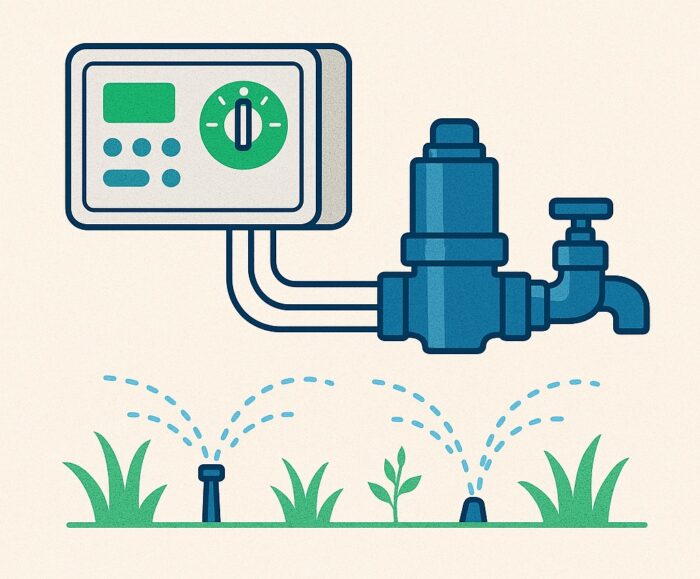When you think about your lawn or landscape irrigation system, the first thing that comes to mind is probably water, not electricity. But if you’ve ever wondered how your sprinklers know when to turn on or how they deliver water to the right zones at the right time, the answer often involves a steady flow of electrical power.
Whether you’re considering installing a new system or simply curious about how your current one operates, understanding the role of electricity in irrigation can help you maintain your system more effectively, troubleshoot problems, and even save money on energy costs.
How Irrigation Systems Work
An irrigation system’s primary job is to deliver water to your landscape in a controlled, efficient manner. While the water itself is supplied by your home’s plumbing or a dedicated water source (such as a well), the system’s brains and muscles often rely on electricity.
Most modern systems use a combination of:
- An irrigation controller or timer – the “brain” of the system that schedules watering cycles.
- Zone valves with solenoids – electrically controlled valves that open and close to let water flow into specific zones.
- A water delivery network – pipes, sprinkler heads, or drip lines that distribute water where needed.
- Optional sensors, such as rain or soil moisture sensors, can automatically pause watering to conserve water.
While the pipes and sprinkler heads themselves don’t need electricity, the components that control and automate the system usually do.
Which Parts of an Irrigation System Use Electricity?
Understanding exactly where and why electricity is used will help you see the bigger picture.
1. Irrigation Controllers (Timers)
Controllers are the heart of most systems. These devices send low-voltage electrical signals to the valves, telling them when to open and close. Without electricity, a modern electronic controller can’t run automatic watering schedules.
- Power source: Most are plugged into a standard household outlet or hardwired to your electrical system. Some battery-powered and solar-powered models exist for smaller or remote installations.
- Voltage: Controllers typically operate on 24 volts for safety, using a built-in transformer to step down the household voltage.
2. Solenoid Valves
Each irrigation zone is controlled by a valve equipped with an electric solenoid. When the controller sends a signal, the solenoid activates, allowing pressurized water to flow into that zone’s pipes.
- Power usage: Solenoids require a brief surge of electricity to open and then a smaller current to remain open during the watering cycle.
- Wiring: Low-voltage wires run from the controller to each valve, usually buried underground.
3. Pumps
If your system uses well water, draws from a lake or pond, or requires higher water pressure than the municipal supply provides, it may include an electric pump.
- Power usage: Pumps can be significant electricity consumers, especially for large properties or agricultural systems.
- Type of current: Most residential pumps operate on standard household current, while larger systems may require 240 volts.
4. Sensors and Add-Ons
Rain sensors, soil moisture probes, and weather-based smart irrigation modules all need a power source, whether it’s hardwired electricity, batteries, or solar panels.
Do All Irrigation Systems Require Electricity?
Not every irrigation system needs an electrical hookup.
- Manual systems: Basic hose-end sprinklers or manually operated valves don’t require electricity, but they also don’t offer the convenience or efficiency of automated systems.
- Hydraulic systems: In rare cases, older systems use water pressure to trigger valve operation instead of electricity. These are less common today due to lower efficiency and fewer options for advanced programming.
However, in most modern residential and commercial installations, electricity plays a key role in system automation.
How Much Electricity Do Irrigation Systems Use?
Compared to major household appliances, irrigation systems don’t typically consume a large amount of electricity — unless they rely on large pumps. For a standard residential system:
- Controllers: Usually draw less than 0.5 kWh per day, even with daily watering schedules.
- Valves: Use only small bursts of low-voltage power during operation.
- Pumps (if present): Can significantly increase energy use. For example, a 1-horsepower pump running for one hour can use about 0.75 kWh of electricity.
While the costs for most homeowners are modest, they can add up over time, especially during the hot Florida summers when irrigation runs more frequently.
Benefits of Electrically Powered Irrigation Systems
1. Automation and Convenience
Set it and forget it — an electric controller allows you to automate your watering schedule so your lawn and landscape get the right amount of water at the right times without manual effort.
2. Precision
Electric valves and controllers can target specific zones, durations, and start times, ensuring plants get tailored watering based on their needs.
3. Integration with Smart Technology
Today’s electric irrigation controllers can integrate with weather data, soil sensors, and even smartphone apps, giving you total control from anywhere.
4. Water and Energy Efficiency
Automated scheduling, paired with rain or moisture sensors, can reduce wasted water, which also reduces the energy needed for pumping in systems that use a pump.
Common Electrical Problems in Irrigation Systems
Like any system with electrical components, irrigation systems can experience issues that prevent them from working correctly.
1. Power Loss to the Controller
A tripped circuit breaker, unplugged power cord, or blown fuse can cause the entire system to stop working.
2. Faulty Solenoids
If a solenoid burns out, the corresponding zone won’t operate. Replacing a solenoid is usually straightforward for a professional.
3. Damaged Wiring
Underground wires can be damaged by digging, pests, or corrosion, leading to intermittent or failed operation.
4. Pump Motor Failure
For systems with pumps, electrical motor issues can halt water delivery to the entire system.
Safety Tips When Dealing with Electricity and Irrigation
Because electricity and water can be a dangerous combination, safety should always be a priority.
- Turn off the power before working on any electrical components.
- Hire a licensed professional for wiring or pump installation to ensure code compliance.
- Protect connections with waterproof wire connectors rated for underground use.
- Regularly inspect wiring for signs of wear or damage.
- Install GFCI outlets for any irrigation equipment plugged into outdoor receptacles.
Can Irrigation Systems Run Without Grid Electricity?
Yes — and alternative power sources are becoming more common.
1. Battery-Powered Controllers
Ideal for small drip irrigation systems or areas without easy access to electrical outlets.
2. Solar-Powered Systems
Some controllers and pumps can run entirely on solar power, reducing operating costs and providing an eco-friendly option.
3. Hybrid Setups
Systems can be designed to use solar for control electronics while pumps draw from the electrical grid.
These options are particularly useful in remote or off-grid locations or for property owners looking to reduce their environmental footprint.
How Irrigators LLC Can Help
At Irrigators LLC, we design, install, and maintain irrigation systems across Central Florida that combine reliable watering with efficient energy use. Whether your property uses a standard grid-powered system, a pump-driven setup, or a modern solar-powered configuration, our team can ensure everything runs smoothly. We can:
- Install new controllers and wire them correctly.
- Troubleshoot and repair faulty solenoids or wiring.
- Upgrade you to a smart controller for better efficiency.
- Maintain and repair irrigation pumps.
- Recommend energy-saving strategies tailored to your property.
Final Thoughts
So, do irrigation systems use electricity? In most modern systems — absolutely. While the amount of electricity used by controllers and valves is relatively small, the role of electricity is essential for automation, precision, and convenience. For properties that rely on pumps, energy use can be more significant, but with the right setup and maintenance, costs can be managed effectively.
Whether you’re looking to install a new system, troubleshoot electrical issues, or explore more efficient options, having a professional on your side makes all the difference. If you’re in Central Florida and need expert irrigation service, Irrigators LLC is here to help.



